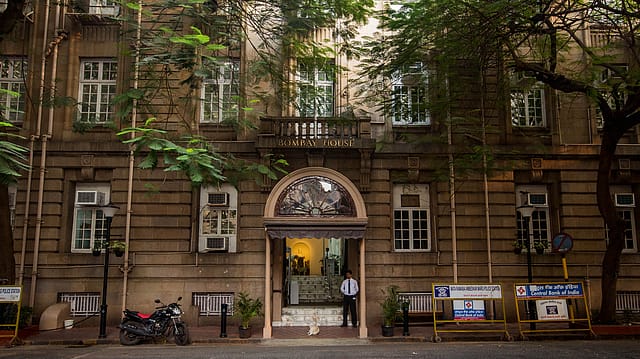Venkat’s exit from Tata Trusts is collateral damage
ADVERTISEMENT

There is always collateral damage in a war. R. Venkataramanan’s exit from Tata Trusts serves as a reminder of this fact.
Venkat, as he is popularly known, was one of the chief lieutenants fighting a pitched battle against former Tata Sons chairman Cyrus Mistry on behalf of Tata Trusts—a clutch of philanthropic bodies that collectively own 66% of Tata Sons. Mistry whose family is the single largest shareholder in Tata Sons was sacked as chairman of the salt-to-software group in October 2016. Tata Sons is the flagship holding company of the $110-billion Tata group and holds significant promoter stakes in various listed and unlisted group entities.
But as it turns out, Venkat, who was managing trustee, wasn’t spared either. In a statement issued on February 13, Tata Trusts said that Venkat, having completed five years with the Trusts, had decided to move on. It is clear as day that Venkat’s decision—voluntary or otherwise—was a function of the adverse regulatory action that has befallen Tata Trusts, and his role as a director and minority shareholder of AirAsia India coming under the scanner.
Venkat’s hurtful predicament arises from the slow cuts dealt him by Mistry, who fought back against Tata Trusts, led by Ratan Tata, and majority of the directors on the board of Tata Sons, who voted on his removal. Mistry was removed as chairman of Tata Sons after a “trust deficit” emerged between Tata Trusts and him. Mistry was accused of trying to undermine the group’s best interests and the legacy of its founders and his illustrious predecessor, Ratan Tata. He, in turn, accused the other side of undermining minority shareholders’ interests and undue interference in operational decisions.
In a letter written after his removal as chairman in October 2016, Mistry made some specific allegations against Venkat, including his alleged role in overlooking fraudulent transactions to the tune of Rs22 crore in AirAsia India, which is a joint venture between Malaysian budget airline AirAsia and Tata Sons. Another allegation pertained to his role in getting Tata Capital to give loans to serial entrepreneur C. Sivasankaran, which later went bad.
Venkat has been Ratan Tata’s blue-eyed boy since he worked for the latter as his executive assistant. He joined the Tata group in 2002 when Tata Communications acquired VSNL. Before that, he was the head of business support at the Qatar Foundation in Doha.
Currently, the Central Bureau of Investigation is investigating Venkat for allegedly lobbying the previous UPA government to give a flying licence to AirAsia India and also relaxing a rule whereby an airline needs to be operational for five years and have a fleet of at least 20 aircraft before it gets the permit to fly overseas. However, despite the allegations levelled and investigated against Venkat, Tata Trusts stood firmly behind Venkat.
But the immediate blow, which led to Venkat’s departure, was dealt by the income tax (I-T) department. The IT department’s investigation concluded that Venkat’s salary of Rs2.66 crore was exorbitant enough to disallow tax exemption to the Dorabji Tata Trust (one of the entities that collectively comprise Tata Trusts).
The board of Tata Trusts stated that it “regretfully” accepted Venkat’s request to be relieved with effect from March 31. A committee of trustees comprising Ratan Tata, Vijay Singh, and Venu Srinivasan, who is vice chairman of Tata Trusts, has also been formed to oversee operations in the interim and to appoint a new chief executive for the Trusts.
At the board meeting held on February 13, Noel N. Tata, chairman of Trent and managing director of Tata International, and Jehangir H.C. Jehangir, head of the healthcare mission at Jehangir Hospital, Pune, were also inducted as trustees of the Sir Ratan Tata Trust.
This has led to speculation that Noel N. Tata, who is Ratan Tata’s half-brother and Mistry’s brother-in-law, may end up with a larger leadership role in Tata Trusts. Tata Trusts will always be comfortable with bestowing responsibilities on someone who carries the surname of the family that founded the business. More importantly, Noel N. Tata has proved his management and leadership capabilities by steering Trent and Tata International ably. Tata Sons and Tata Trusts also have a long-standing desire of creating a meaningful overlap of personnel between the two entities that are critical decision-makers as far as the entire group is concerned. Noel N. Tata’s presence at the Tata Trusts may also work in his favour when it comes to finding a seat on the board of Tata Sons.
For Venkat, the future is uncertain, but not necessarily bleak. Indeed, he will have to get the monkey off his back by successfully defending himself in the CBI investigation. But that doesn’t mean an end of association with the Tatas. Given the equity that he enjoys with Ratan Tata, he may find some executive leadership role at the group level. And even if that doesn’t happen, he can still remain associated with RNT Capital, Ratan Tata’s private investment firm.
Meanwhile, Mistry would be reading today’s news with more interest than usual.